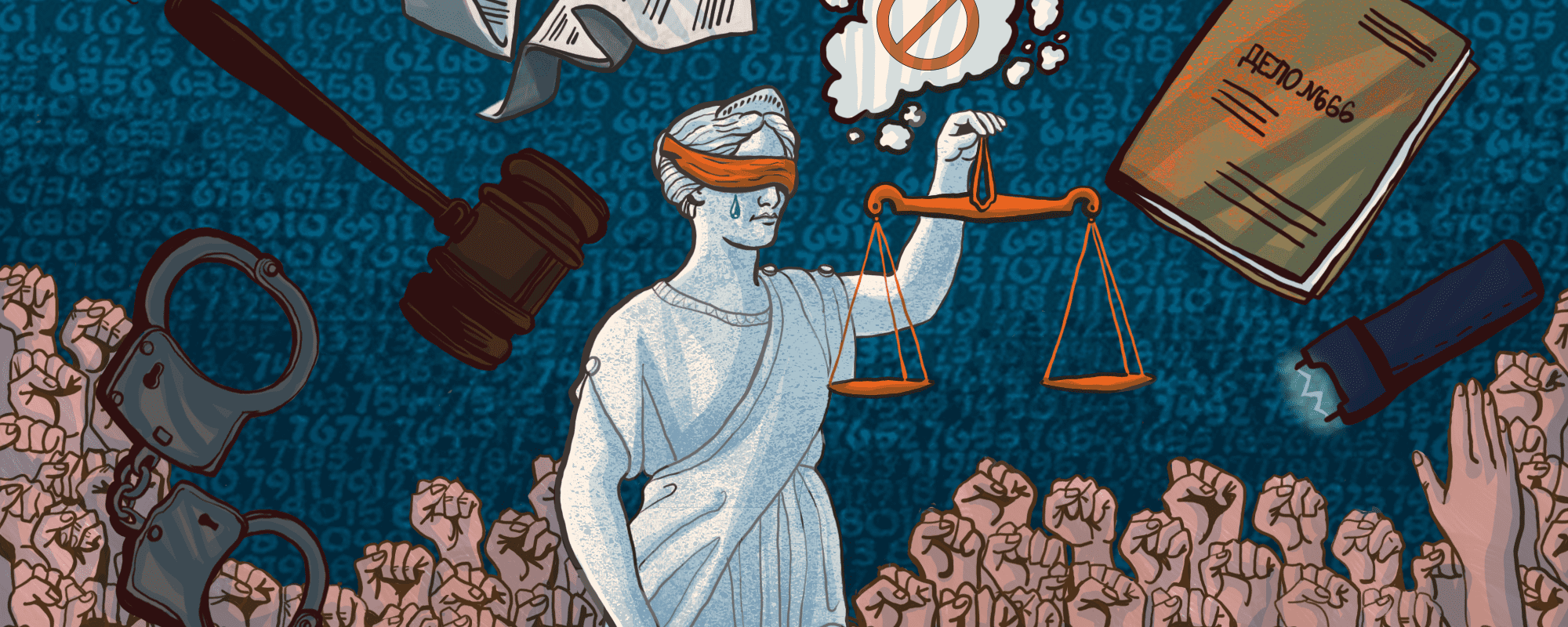We collect information about political prosecutions in Russia, and the defendants in the cases. On this page you can find the dynamics, reasons, articles and regions of prosecutions.
To learn more about which cases we consider politically motivated and what data you can find in the database, go here. Read more about the convictions in these cases here.
Freedoms for which people are prosecuted
A prosecution case of a person can often be attributed to different subjects, for instance, it may fall under both «freedom of association» and «freedom of conscience». These prosecutions are accounted for in both topics.
This chart, among other things, shows that before the full-scale war the main subjects of prosecutions were freedom of association and freedom of conscience, which was due to the cases against Jehovah’s Witnesses and Hizb ut Tahrir. After the war began, freedom of speech became the most frequent subject.
Criminal articles
These charts represent the number of prosecutions for every article in the Criminal Code of the Russian Federation, as well as the change in the number of cases by the year when they were started. Prosecutions under several articles get into respective columns for each of the articles.
On this chart, for instance, one can see how many journalists are prosecuted under the Article 205.2 of the Criminal Code.
Rating of regions
Here we are not comparing the regions where the defendants live, but rather the regions in which the major part of the prosecution took place.
On this chart, for instance, one can see that Krasnodar Krai and Crimea are among the leaders in prosecutions against journalists and bloggers.
Go back: database of politically motivated criminal prosecutions
FILTERS
The location of the persecuted persons is divided into:
- Deprived of liberty — in a pre-trial detention center, in colonies, under house arrest or in compulsory treatment;
- At large (prosecution ended) — those who have served their sentence, have been released from punishment, have been acquitted, or whose cases have been dismissed;
- Non-custodial sentence — those who received a sentence without imprisonment (e.g. — suspended sentence) and have not yet served it;
- Location unknown — location unknown or on the wanted list;
- At large (under investigation) — under a preventive measure that does not imply deprivation of liberty;
- Not in Russia — the person is not currently in Russia;
- Deceased — a person passed away during or after the persecution — the details are not always known to us;
Subject meanings:
- Freedom of assembly — persecution related to participation in public actions or calls for them;
- Freedom of speech — persecution for public statements in various forms;
- Freedom of association — persecution related to participation in organizations or associations;
- Freedom of conscience — persecution for participation (including alleged) in religious organizations and movements;
- Other — persecution that does not fall under the criteria above.
The filter «Color highlights» allows you to segment information about the defendants by sex, age group, or citizenship. If the column says «Unknown», it means that we don’t have information about it yet.
If the «Citizenship» field contains countries separated by a comma, for example, «Russian Federation, Ukraine», this means that a defendant has a dual citizenship. «Other» covers over 25 countries that defendants are citizens of.
The «Sex» field indicates the sex specified in the defendant’s documents. If the «Sex» field says «Unknown», it means that we don’t have exact information.
«Age» is the defendant’s current age. The defendants' ages are grouped into «under 18», «18-30», «31-50», etc.
The filter «Group of criminal cases» groups several criminal cases which have the same main direction of prosecution. For example, «Cases against Jehovah’s Witnesses» include cases in which the defendants are Jehovah’s Witnesses, and «Anti-war cases» are cases in which defendants are persecuted for expressing anti-war statements.
«Year prosecution started» is the year when the prosecution of the defendant started within a specific criminal case. We take the date of the beginning of the prosecution from open sources. If there is no exact date, you can only see the year or year/month.
«Year of sentence» is the year when the final verdict was issued to the defendant within a specific criminal case. We take the date of the sentence from open sources. If there is no exact date, you can only see the year or year/month.



